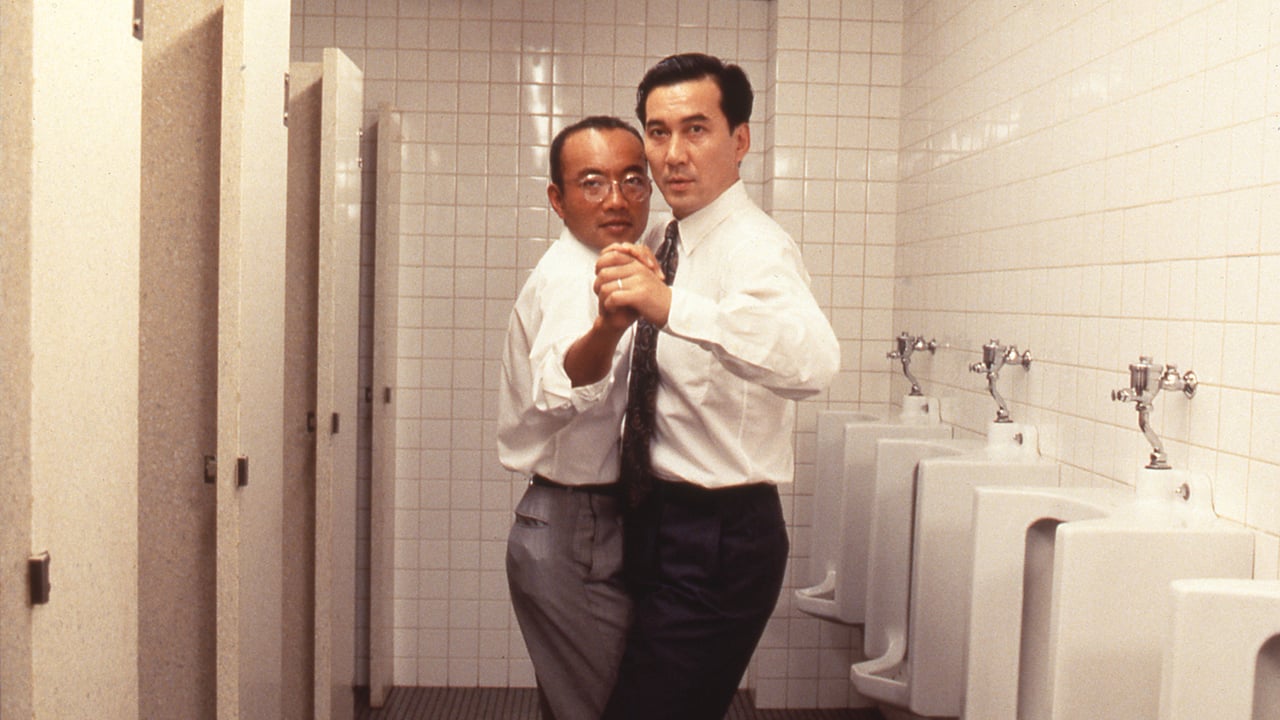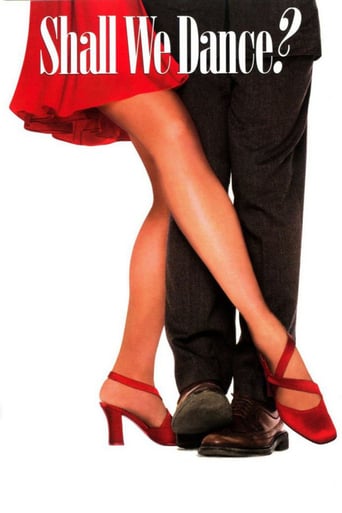

Dancing: The vertical expression of a horizontal desire legalised by music. This quote may have been in the mind of middle aged salaryman Shohei (Kaji Yakusho) who realises that his life is unfulfilled as he watches dance instructor Mai (Tamiyo Kusakari) every night from his commuter train. In a moment of impulsiveness, he signs up for dance lessons to be near the sphinx like Mai. This might have been a movie about the budding romance between the somewhat improbably beautiful leads. Instead director Masayuki Suo focuses more on the excitement and passion of the ballroom than the attraction between Shohei and Mai, and makes a better, less predictable movie for it. Both the lead and supporting roles are played to near perfection, though Naoto Takenaka as the troll like Latin wannabe Mr. Aoki, shamelessly steals every scene he is in.Will Shoheis horizontal aspirations be fulfilled? Will his irredeemably dull wife discover his guilty secret? Will he go to the ball? You can be reassured that these questions will be answered to your satisfaction by the end of this endearingly sweet movie.
... View MoreThis is the original Shall We Dansu, a Japanese film that takes a look at the society around it and the shameful act of dancing. It is considered out of the society's norms to dance, whether it is in a studio or at home, especially ballroom dancing. This is exactly what the main character Shohei Sugiyama is looking for to break from his mundane life. While the topic of the film is better understood with the knowledge of Japanese culture it is still hilarious to watch while still maintaining its heart-felt plot.Shall We Dansu has a very serious plot of a man trying to break from his daily routine, but also adds in a slew of comedy through gags and dialog. Some scenes are laugh out loud while others just give a chuckle to break up tension. However, this is a very funny film with a very interesting story line.The one thing to be aware of is that this is the original Japanese version. There has been a more recent Hollywood version that falls very short in comparison. The Hollywood version was a flop and took an amazing movie and turned it into a pointless waste of time. Do not see the remake; instead look at this original film, which is able to captivate humor and drama all in the same moment.The most important thing to understand about this film is that in this Japanese society it is taboo to dance. If you try to place this film outside of that context, like how the remake attempted, it loses everything that makes this film worth seeing. While analyzing society, and the norms of that society, Shall We Dansu is a captivating experience that mixes humor with drama to allow for an entertaining film experience.
... View MoreThis film is a marvel of character study. No character in this film is flawless, and as we learn of their human weaknesses, we are drawn in by empathy and curiosity.There are some genuinely touching moments dealing with embarrassment, joy, and humor. If you are a ballroom dancer or have ever taken lessons, you will draw on that experience as you watch.This could be a good family film if the kids are old enough (12?) and can deal with the subtitles. You might have to explain why a wife would hire a private detective to spy on her husband. I would say this is a great date movie. The ending is nothing surprising but is very satisfying and well scripted and filmed.
... View MoreHave you ever danced? For most the simple answer is yes, and then of course we each like to add either our stories or explanations. For women these stories are usually pleasant, either their first dance at school, or they actually had dance training when they were younger. But for men, the tables turn. If they had ever danced, they usually say they were forced into it, that it was "only for a little while" or that they simply hated it. We all know that dancing cannot possibly be that horrendous or painful, then why do so many men find it necessary to cover-up their dancing, especially if it was out of personal interest. Now, imagine yourself in a society where dance is socially forbidden, not in any shape or form, not between husband and wife and most definitely not out of personal interest. It is considered shameful, embarrassing but it is an escape, a way to enter an alternate universe of your life in a split second, would you do it? What if dancing forced you into secrecy and as hard as you tried to deny it, it became your passion. Would you let dancing go because of society or would you keep it close to your heart forever, if your heart deems it necessary?Mr. Sugiyama was a successful Japanese businessman, a "salary-man" who stayed late at work and went out with co-workers afterward, a custom necessary for your success within a company. Usually coming home late, he knew that tomorrow was going to be the same as the day before and the 20th day from now; his life has been set for him. On the train on the way back home he notices a young woman looking out a window on the top floor of a building. She catches his attention immediately and after many debates with himself, over several days, he decides to come see her, only to find out it is a dancing establishment. He gives it a chance nonetheless, and once he finds Mr. Aoki, a fellow co-worker, hiding behind a wig at this same establishment, he starts to gain confidence and awareness that maybe it is alright to enjoy dance. He becomes engrossed in it, disciplining every aspect of his dancing whether on the train or even at work, and dance gives life to him, showing in simply the way he rides his bike. Yet Mai, the woman who first caught his attention and an instructor within the school, has seemed to lose this passion that he just found for dance. It takes one dancing competition, in which Mr. Sugiyama participates and Mai instructs him, for both of them to face their fears, define their personal meaning of dance, and determine what is truly important and necessary in their lives. Maybe not everyone can relate to dancing, but there may be something that each of us has in our hearts to do that we are simply forbidden. Moreover, I believe this picture correctly portrays the passions of humankind, the lack thereof, and the effects of both on the human being. The director allows us to see Mr. Sugiyama's transformation, how Mr. Sugiyama first develops his passion for dance showing no longer just at the dance school, but everywhere else, at work and at home. In contrast, the director shows Mai, an almost stoic woman who has this opportunity to dance and yet it no longer brings life to her. The acting is wonderful and we are left wondering what it is that happened to her and whether Mr. Sugiyama will continue to dance. However, something seems to be missing in this film. I believe the director could have given more life to the picture itself, especially when representing something so expressive as dance. It may be that factor that I have danced before, but other than some short scenes at the beginning or end, this picture lacked an artistic aspect to give life to the passions of those involved. There is only so much that a storyline and acting can provide, and the artistic element fills in the vacancies. For me, the director failed to do so, both within the dance studio and during the competitions.
... View More